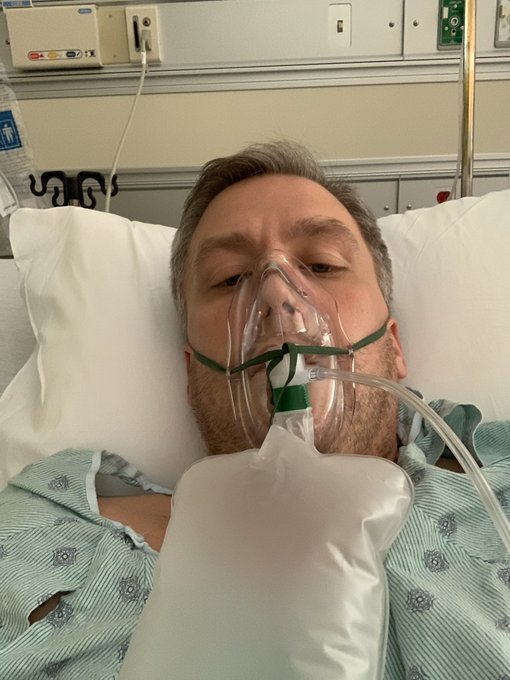Doctor Who Traveled Fighting World Virus' Falls With Covid-19 Even After 3 Tests Were Neg.
[adamfoxie]: As you read this keep in mind what the Doctor says of why being tested three times after getting sick the testing came back negative. He explains there are many things about this virus we dont understand. He explains he waited a week before getting help, meanwhile his level of covid must've have dropped. He continued, After the virus invade and does its damage the amount of the virus droppes meanwhile the body has been invaded and is dealing with all the damaged it already the virus did. It's very similar to HIV/AIDS. What HIV did was advanced to AIDS and it was the damaged by AIDS that killed those without meds and it did so in some very quickly. You are not dying of covid but of the damaged is done and then having the body realized many of their white blood fighter cells are now the virus even though they look like good cells. The body's inmune system goes into an all out attack that kills good and bad cells. That is usually what happens with Covid-19 in the lungs. It is the body that thows the attack that fills the lungs with infected liguid from the cells.
At the end what got the the Dr. when he was so healthy and follow all the protocls since he was teaching them to others? Read on..
At the end what got the the Dr. when he was so healthy and follow all the protocls since he was teaching them to others? Read on..
One of NBC News' and TODAY's most knowledgeable experts on the coronavirus outbreak has now been diagnosed with COVID-19.
On Wednesday morning, NBC News contributor and virologist Dr. Joseph Fair tweeted that he's been hospitalized after contracting the coronavirus. He last appeared on TODAY in late April.
Download the TODAY app for the latest coverage on the coronavirus outbreak.
"My friends wondering where I’ve been: I came down with #COVID19& am hospitalized," he wrote. "I’m on the other end of it, but not out of the woods yet. Please continue to social distance. I used max precautions, but still managed to contract it. Back as soon as I’m able, friends. #StaySafe."
It's possible that Fair contracted the virus during a recent flight from New York City to New Orleans, he told TODAY. He was flying home, and his airline did not enforce social distancing measures.
"I had a mask, I had gloves on, I did ... my normal wipe-down, but you can still get it through your eyes," he said. "I was seated right next to someone. The flight was full."
Once Fair arrived, he left his home once to go to the grocery store, where he practiced "max precautions," he said. Three to four days after his flight, he started to develop "a complete lack of appetite," muscle aches and a slight fever.
"At that point, it wasn't 'classic COVID symptoms,' but nothing is. That's what we're learning," he explained. "It's just so variable."
For the first three to four days of symptoms, Fair said it wasn't serious enough for him to seek medical attention. He had spikes in his fever that got as high as 104 degrees, but he opted to self-treat with Tylenol, lots of fluids and fruit — "basically what you do when you have any cold or flu," he added.
But heading into last weekend, his symptoms started to worsen, and on Saturday, he noticed he was getting very short of breath.
"By Monday, I couldn't take a full breath and had to call an ambulance," he recalled. After visiting the emergency room, he was admitted to Tulane Medical Center because of a bacterial lung infection, which caused his shortness of breath. He received four tests for COVID-19, all of which were negative, but doctors told him that they had no doubt that's what he had. Fair said that a plausible explanation for his negative tests was that "the virus itself has passed out of my system, but my system is still responding to the damage that the virus did."
Even for Fair, who's been on the front lines of outbreaks, including Ebola, the first day in the hospital was "very frightening," he said. "There's something particularly scary about not being able to get air. That part was anxiety (inducing)."
He added that he asked his doctors only to intubate him if "there was no other choice," so they treated him with an oxygen mask, visible in the image in his tweet. After three days in the hospital, he's still a little short of breath, but he's responded well to oxygen.
At 42 years old, Fair runs 5-10 miles a day, has a "good" lung capacity and no underlying conditions. So he said one of the learnings of his experience is "if it can take me down, it can take anyone down."
As he told one fan who responded to his announcement on Twitter, "Nobody is immune! Not even a virus hunter."
Fair hopes to be discharged from the hospital this weekend and has recently left the critical care floor.
Finally, he stressed: Don't be in such a hurry to get back to life as normal.
"Your life is more valuable than any kind of short-term discomfort you may have, (even) economic," he said. "Do not put yourself in a situation that instinctively feels dangerous, and you'll know when it does.







Comments